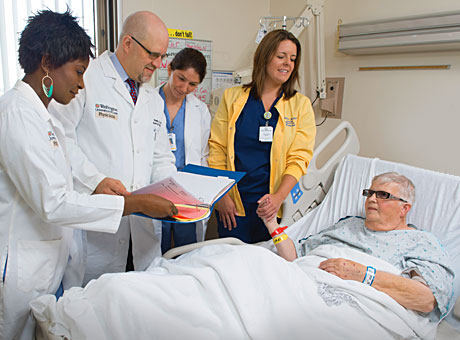
Patients such as Darlene Weaver benefit from a trauma team specialized in caring for older adults. Above, she discusses her progress with, left to right, Afou Boire, NP-C, Douglas Schuerer, MD, Jessica File, ANP-DC, and Amy Houchin, RN, at Barnes-Jewish Hospital.
New specialized trauma services by Washington University physicians at Barnes-Jewish Hospital focus on the needs of older adults — a major demographic that is growing quickly as the baby-boom generation ages.
“Elderly people are prone to fall and are more sensitive to major injuries,” said Grant Bochicchio, MD MPH, the Harry Edison Professor of Surgery and chief of the Section of Acute and Critical Care Surgery at Washington University School of Medicine. “They have significant comorbidities, and if you do not optimize their care early and aggressively, they are more prone to have bad outcomes. Geriatric trauma is truly a specialty that is becoming important now with a growing aging population.”
Creation of a geriatric trauma service at Barnes-Jewish Hospital almost a year ago enabled the trauma team to better organize care for older adults. When geriatric trauma patients come to the emergency room for care, they are evaluated, admitted immediately to the geriatric trauma service, and if needed, fast-tracked for surgery. Patients return to the trauma service after surgery.
“In my opinion, it is becoming a separate specialty, similar to pediatrics.”
— Grant Bochicchio, MD
Patients receive treatment tailored to their age and health conditions. This includes administering fluids without overburdening the heart and monitoring dosage of pain and other medications. “In my opinion, it is becoming a separate specialty, similar to pediatrics,” Bochicchio said.
Early data for geriatric trauma patients at Barnes-Jewish Hospital are encouraging; average length of hospital stay decreased by about 20 percent in the first six months.
Development of the service follows a trend toward greater service specialization among Washington University trauma surgeons at Barnes-Jewish Hospital. As recently as the 1980s, general surgeons all took trauma call, and the service was more loosely organized. With the recruitment of Palmer Bessey, MD, as director of burns, trauma, and critical care, and later under the extended leadership of Timothy Buchman, PhD, MD, a group of surgeons who specialized in trauma, emergency surgery and wound care began managing patients who came in through the emergency department or had problems with chronic wounds.
Future efforts to improve care for critically ill and injured patients are also taking shape in the community. Douglas Schuerer, MD, medical director of trauma, helped write new state regulations for transport of patients with stroke, heart attack and trauma as chair of the Trauma Subcommittee of the State Advisory Council for Emergency Medical Services. Under the regulations, patients with these diagnoses will be taken to the highest-level trauma center for their condition immediately.
“There is very great evidence that people who get to trauma centers sooner have better outcomes,” Schuerer said.







